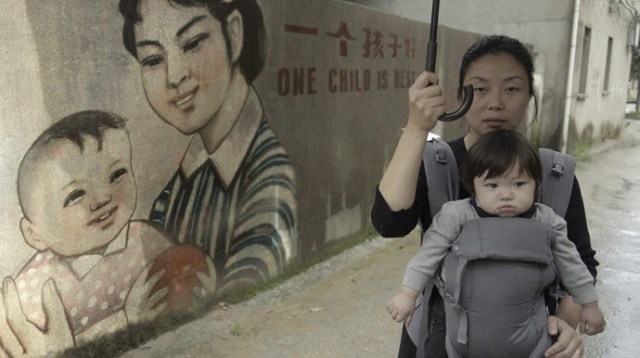
Documentary film “One Child Nation”, which won the Grand Jury Prize when it was shown at the Sundance Film Festival early in this year, is often powerful and heart-wrenching in its sobering but intimate presentation of one brutal family policy in China during 1979-2015. Because I read a number of columns on its subject many years ago, I knew what I was going to get from the documentary, but it still disturbed me from time to time as sharply reminding me of how a system can be cruel and heartless to its individuals in the name of ‘greater goods’.
At the beginning, Nanfu Wang, who directed and produced the documentary along with Jialing Zhang, tells us how she came to be interested in the subject of their documentary after one important moment in her life. Several years after she left China and then settled in US, she happened to have her first child, and her experience with her child subsequently made her muse a lot on how much her childhood life in the 1990s was dominated by propagandas emphasizing the one-child policy of the Chinese government. Quite determined to quench the increase in the population of China by any means necessary, the China government put numerous restrictions upon any couple trying to have more than one child, and it had no qualms about resorting to a number of drastic measures such as compulsory abortion or sterilization.
For getting to know more about the ramifications of the one-child policy during that time, Wang went back to her rural hometown in China along with her baby, and she came to reflect more on her childhood past. Disappointed to have a daughter instead of a son, her parents tried quite hard for getting the permission to have another child, and they were eventually allowed to do that five years later. Due to the Confucian patriarchic belief to which they and many other people in China and many other Asian countries firmly stick, everyone in the family including Wang’s grandparents desperately wished that it would be a boy this time, and her younger brother says with bitter amusement that he would have been abandoned by his family instantly if he had been a girl.

There were many people in the village who were less fortunate than Wang’s parents, and an old man who was the village chief during that time tells about how he simply followed whatever was instructed by the government officials above him. While he feels regret over what he committed to some of his village people, he also emphasizes that he had no choice from the beginning. The Chinese government periodically evaluated the population increase in many towns and cities, and local officials like him got rewarded and punished according to whether they successfully suppressed the population increase of their towns and cities or not.
While not many people in the village are very willing to talk for understandable reasons, there are several people who do not hesitate at all to talk in front the camera. An old midwife, who is incidentally a friend of Wang’s family, still remembers numerous women on whom she performed abortion or sterilization, and there is a little touching moment when she reveals to us how much she has tried to atone for her horrible deeds on thousands of women and unborn babies during that time. She knows well that the past will never go away from her, but she finds some consolation from those many banners of gratitude sent from her clients during recent years, and she is certainly proud of how she helped them a lot.
In case of an old woman who was once a famous public emblem of the one-child policy, she is also quite frank about what she did during that time, but she shows no regret or guilty at all in contrast. In her view, she and many other government officials were in an important war for the prosperity of their country in the future, and it goes without saying that they did their job quite effectively considering that the Chinese government came to turn itself away from its one-child policy after 2015.

However, it is also undeniable that the lives of millions of families were damaged and ruined during that time. Two of Wang’s aunts had to abandon their baby daughters, and the documentary later shows us how many of those countless baby girls abandoned by their parents were sent to orphanages and then subsequently handed to couples from the Western countries. Moreover, government officials even took away babies and small kids, and there is a heartbreaking case of a poor country girl who got separated away from her twin sister, who later turns out to be residing in US at present.
As steadily maintaining their calm and focused storytelling approach, Wang and Zhang gradually present a disturbing big social picture which often looks like the flip side of that of the American society, which has put pretty heavy legal regulations and restrictions on abortion in contrast. As pointed out around the end of the documentary, both of these two contrasting cases are serious infringement upon women’s reproductive rights, and that surely reminds us again of how much women have been mistreated and discriminated throughout the human history.
In conclusion, “One Child Nation” works as not only a moving work of personal introspection but also a sharp reminder of what should not be forgotten, which is accentuated more by an ironic moment at the end of the documentary. The Chinese government recently changes its family policy without looking back at that terrible past at all, and you may wonder whether the past will be completely wiped out in the end. At least, Wang and many others in China still remember, and the documentary will probably last for a long time as a record of the past.








Pingback: 10 movies of 2019 – and more: Part 2 | Seongyong's Private Place